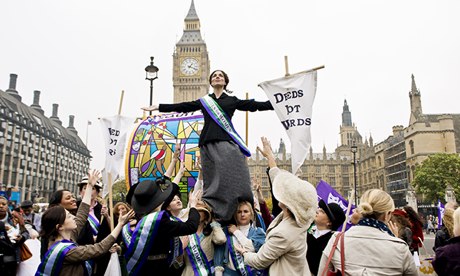
The unions that held these islands together and regulated their dealings with the outside world are straining, maybe to the point of collapse. Crises always provoke good writing and the uncertainty about England's relationship with Scotland and Britain's relationship with the European Union has produced two books that are well written, well researched and well worth reading.
Unfortunately, both end with calls for action that will appeal only to the converted. Without meaning to, their authors reveal the impossibility of producing a coherent reform programme in a country caught up in the double standards of its gormless culture wars.
Daniel Hannan is a Conservative member of the European parliament. After seeing the arrogance and corruption of Brussels close up, he turned for comfort to the long tradition of British freedom. The result is a defence of the unfashionable Whig view of history. Hannan argues with patriotic pride and conviction that liberty as it developed in England and spread through Britain and much of the empire is distinctive and distinctively successful.
He has many asides for the reader to enjoy. I had never heard the word "Toryentalist". But his dismissal of 19th-century imperialists, who insisted that freedom could never flourish in India because Indian culture and history mandated despotic rule, is in my dictionary now. As you are just as likely to find Toryentalists on today's left as the 19th-century right, Hannan's critique of the assumption that oppressive cultures can never change is all the more useful and bracing.
While I'm about it, I'll also steal Hannan's precise measurement of the failure of totalitarians to get anywhere in Anglo-Saxon democracies. While fascism and communism swept much of the world, communists never succeeded in electing an MP in Australia and New Zealand. They elected just one in Canada. Meanwhile, the British have returned a mere six revolutionary socialists as MPs – five if you don't count George Galloway, who is more a creature of the religious far right than revolutionary left.
In the end, however, Hannan loses his self-control. The book degenerates into incontinent complaints about Barack Obama, the welfare state and human rights. To his confused mind, it is apparently fine for the Americans to enjoy the protection of the Bill of Rights, but not for the British to enjoy the protections of the Human Rights Act. It is as if the history of Anglo-Saxon liberty from the Witan through Magna Carta, the Levellers, the Glorious Revolution, the American Revolution and the suffragettes has been one long struggle to reach its perfect consummation in the hand-me-down prejudices of last week's Daily Telegraph.
Linda Colley is such a good writer I'd buy her shopping lists if anyone published them. Her essays on the myths of Britishness contain a warning against Hannan's double standards. "The cult of superior British liberty," she says, "has often been deployed to uphold and maintain the political status quo." The best you can say is that liberty moves fitfully in Britain, she continues. After the 1832 Reform Act, a higher proportion of the male population was enfranchised in Britain than in almost any other European country. By 1900, the franchise was one of the narrowest in Europe. The soldiers we will commemorate in 2014 marched to the Somme to defend democratic rights many of them did not enjoy.
But Colley has blind spots of her own. Nowhere in her 15 essays did I find a glimmer of admiration for Britain's traditions of free speech, say, or trade union rights. Like so many on the middle-class liberal-left she can barely bring herself to say a good word about her country. Without realising what she is doing, she hands to the right all patriotic feeling, all notions that there are ideas and movements in our history that are worth defending. As Hannan demonstrates, grateful conservatives are more than happy to fill the space the unpatriotic left has vacated.
Maybe because she is an academic, or maybe because this book began as lectures for the BBC, Colley cannot admit that she is arguing a partisan case. She examines the fading hold of British identity and says that soon we will need a federal constitution and a parliament in England as well as parliaments in Wales, Scotland and Northern Ireland. All very liberal and democratic, you might think, but her liberalism stops at the Channel.
Remarkably for a historian trying to illuminate our constitutional crisis she has no interest in the enormous impact of the EU and European law. The English do not have their own parliament, she opines as she dismisses Euroscepticism, so they are "alienated" from a European project they would otherwise embrace.
In other words, anyone outside her tribe is in the grip of a delusion. Because in Colley's world support for the EU is taken for granted, she cannot make an argument to convince outsiders. They are left shaking their heads at her inability to see how the lack of democratic accountability and the ruin the euro has brought to southern Europe are legitimate concerns.
I finished these books thinking that on right and left it is impossible to discover a reform programme that treats democracy, devolution and human rights consistently. The British are like contestants picking a box to open on a game show. Open the box on the right and they find concern about the EU's threat to representative government and the democratic deficit in England, but nothing on human rights. Pick the left box and they have concerns about devolving power and a commitment to human rights, but nothing on the EU beyond the condescending view that worries about Europe are Little English hysterias.
Whichever box they pick, however, they will never find the prize of a modern liberal democracy because no one is prepared to offer it.

